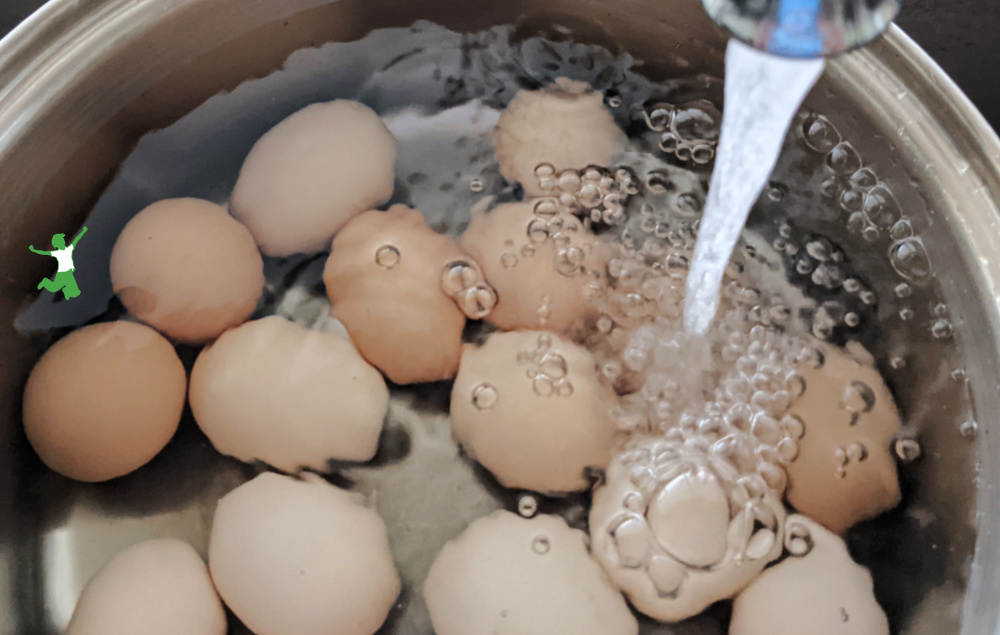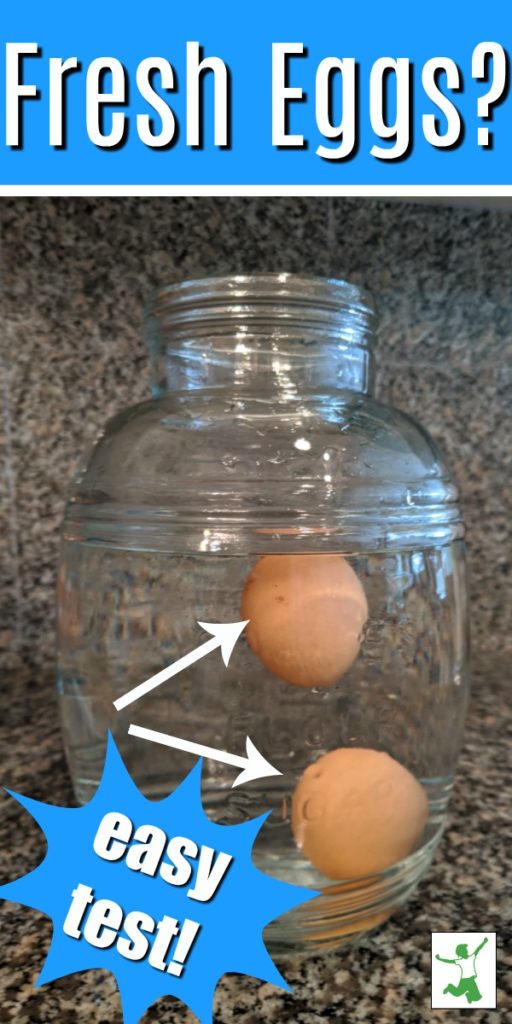Table of Contents[Hide][Show]
Quick and easy test using a glass of water to tell if you have fresh eggs, moderately fresh eggs, or old ones that should be thrown away.

Don’t you just love the way truly fresh eggs look in a bowl after you crack them? The yolks are so perfectly rounded and the whites whip up into the fluffiest meringue!
Fresh eggs go with the territory when you purchase from a local farm. Good quality, pastured chicken, goose, and duck eggs sell quickly enough that there isn’t any need for the tricks the egg industry uses to prolong egg freshness.
These questionable techniques include chemical-laced washing, partial freezing, and cold storage for weeks at a time before they hit your supermarket shelf.
These practices differ considerably from methods for preserving egg freshness at home!
Even if you buy organic eggs from Whole Foods or other health food stores, it is possible to get old eggs.
Old eggs not only don’t taste as good, in my opinion, but they also don’t poach nicely into that perfect egg shape that sits so pretty on top of a slice of sprouted toast or sourdough English muffin.
Do you suspect your fresh eggs might be less than really fresh?
If so, here are two clues that you need to find another egg source as suggested by Kenji Lopez-Alt, Chief Creative Officer of Serious Eats.
The Julian Date Tells the Tale
In the United States, every egg carton sold in a store is required to be stamped with a number between 000 and 365.
This number is the Julian Date and indicates the day of the year that the eggs were cleaned and packed into the carton.
A carton stamped with 000 means the eggs were packed on January 1 and a number of 213 means they were packed on August 2.
The bottom line is that you want a date as high as possible ideally only a few days to a week from the Julian date of the day you are purchasing the eggs.
Do not look at the date just to the right of the Julian Date as this is the expiration date of the eggs and could be up to six weeks after the eggs were packed!
For example, an egg carton stamped with the numbers 015 Feb 28 means that the eggs were packed on January 15 but the eggs can be sold until February 28 – a month and a half later!
Who wants six-week-old eggs that the store can legally sell as “fresh”?
Not me!
The Float Test for Fresh Eggs
The second way to test the freshness of your egg is to carefully place the egg in a cup of water.
To test multiple eggs at once as shown in the photo above, use a large pot.
- The freshest eggs will sink and remain flat lengthwise at the bottom of the cup.
- Semi-fresh eggs will stand up on one end and not lie flat at the bottom. They may also partially float in the water but remain fully submerged.
- Old eggs that should be tossed will float at the very top of the water.
In short, the older the egg, the more it floats.
The reason the float test works is because an air pocket in the fatty portion of the egg increases in size over time.
This air pocket is the cause of the increased floating action of older eggs in the water.
Blood Spot Eggs
Another way to spot a fresh egg is to shine a light through the shell. This is called “candling”. If you see that the egg yolk has a blood spot, this is an indication that the egg is quite fresh.
While blood spots are fairly common, they don’t happen often in commercial eggs because eggs with any defects are removed before packaging.
Thus, this test is only helpful if you obtain the eggs locally from a small farm or market.
Overall, the float test is the best option to test all your eggs regardless of where you purchased them.

Why Freshness Matters
As with any food, the fresher the better….for taste as well as nutrition.
Who wants eggs that have been semi-frozen and in cold storage for weeks before you even get them home just to increase shelf life?
Certainly, this is not a good option particularly if you are soft boiling the egg to feed your baby the warm, liquid yolk as a traditional first food!
Fresh eggs also separate better. A nice, perky yolk can be separated easily with your hands without a single drop mixing in with the white to ruin your macaroons!
Finally, fresh eggs are so much easier to poach. Fresh eggs have tighter whites as well as yolks that retain their shape better as they cook.
So if Eggs Benedict or another breakfast egg recipe is your thing, you will want to ensure that your eggs are as fresh as possible.
And, don’t forget. Nature’s perfect food is delicious later in the day too. Check out these ideas for lunch eggs or dinner recipes using eggs to get you started.
More Information
Why Organic Store Eggs are a Scam
What Oxidizes the Cholesterol in Eggs?
Best Egg Substitute (plus video how-to)







Hi sarah, I was wondering if I could use this for an assignment that I’m doing at school, I know its a few years later but I need it as a source. If you don’t mind me using this could you please leave your full name and the date when you wrote this. Thank you.
The biggest problem with fresh eggs is that they are very difficult to peel when hard boiled. Waiting until the eggs are about three weeks old makes for easier peeling and less waste stuck to the shell.
I love farm fresh eggs! I have tried frozen eggs before and they just don’t have the taste yuck!
Really, nice trick. I never thought that there can be such a difference in the fresh and old eggs.
I have eggs from April 2 2014 and I was wondering if they are still good to use? They are farm fresh and did wash them straight from the nesting box to the fridge. See I wash them, date them, then store them in my fridge right away. Will they still be good today?
If they float in a glass of water, I wouldn’t use them.
Washing your eggs can actually make them go bad faster. It washes the protective layer called the bloom off of it.